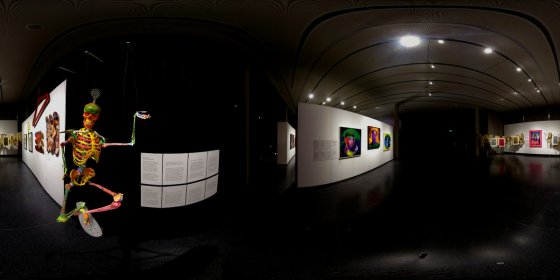VR 360° - Looking through Kiki's Eyes - Jonny Zerox

Bei dieser Ansicht, handelt es sich um eine barrierefreie Version,
hier geht es zur virtuellen interaktiven 360° Version der Tour 'Looking through Kiki's Eyes - Jonny Zerox'.
hier geht es zur virtuellen interaktiven 360° Version der Tour 'Looking through Kiki's Eyes - Jonny Zerox'.
verknüpfte Standpunkte
"Portrait For Kiki - Fly Me To The Moon""No Hang Ups"
"Armour & Selfie"
"Shades of Asia"
"Corporate Upgrade"
"The Future is Female"
"Edie Sedgwick - Factory Girl"
"Eve: Why Blame Me?"
"Militant Defector"
4_Johnny_Zerox_stitched_P
enthaltene Informationen
″No Body Home - SURF AT YOUR OWN RISK″ (ENG) ⇒
For Kogelnik, the human body was something that could be engineered, programmed, plugged in and turned on. She often used body parts, bones and skulls and made a series of sculptures by
combining a polyurethane forearm with a telephone receiver, an electric plug or a light bulb, respectively in “Human Spare Part” (1968), “Plug-in Hand” (1968) and her iconic Skeleton “Bones Boy” (1969).
Besides the human figure, atoms, orbits and the circle were the most frequently employed motifs in Kogelnik’s visual vocabulary. She used various methods of creating level circles in her paintings. The idea of skin as something that can be slipped off was used as a metaphor for the radiation burns of Hiroshima and Nagasaki and the Napalmblistered victims of US interventions in Vietnam.
By 2029, the American inventor and futurist Ray Kurzweil announced that we would have completed the reverse engineering of the human brain. That will provide us with the software and
algorithmic methods to simulate all of the human brain’s capabilities, including our emotional intelligence. Computers will be far more powerful than the human brain, working at electronic
speeds millions of times faster than the human language. Machines will continue to grow exponentially in power and will be capable of improving their own software design.
Kurzweil calls this phenomenon ”the singularity”. In late 2021, Facebook's CEO Mark Zuckerberg announced the launch of the “Metaverse” — defined most simply as a virtual world where
people can socialize, work, and play. Zuckerberg believes the use of VR- (virtual reality) and AR- (augmented reality) tools will go a long way in expanding the “Metaverse”, making it feel
like a real experience as opposed to a video game.
At its highest level, the “Metaverse” is a virtual, online world, a digital space that mirrors real life, but it is not restricted by the rules of the real world. He believes it will bring people closer together in previously unheard-of ways! Although policies have tended to give an illusion of user control - in reality you cannot see or control what the company does with information about you. Big data is used not only to sell targeted advertising, but also to make an increasing array of high-stakes automated decisions around employment, investment,
lending, and consequential government decisions in areas including criminal justice, education, and access to public benefits. Referred to by some as “surveillance capitalism”, it is an economic system centred on the commodification of personal data with the core purpose of profit-making.
The digital revolution began with great promise however when do we start worrying that the tech giants driving are becoming more interested in exploiting us than serving us?
″Niemand Zuhause - SURFEN AUF EIGENES RISIKO″ (DE) ⇒
Für Kogelnik war der menschliche Körper etwas, das konstruiert, programmiert, angeschlossen und eingeschaltet werden konnte. Wie in ihren Arbeiten „Human Spare Part“ (1968), „Plug-in Hand“ (1968) und bei ihrem legendären Skelett „Bones Boy“ (1969) verwendete sie Körperteile, Knochen und Schädel oder kombinierte einen Polyurethan-Unterarm mit einem Telefonhörer, einem lektrischen Stecker oder einer Glühbirne.
Neben der menschlichen Figur waren Atome, Planetenbahnen und der Kreis die am häufigsten verwendeten Motive in Kogelniks Bildsprache. Sie verwendete verschiedene Methoden, um in ihren
Gemälden ebene Kreise zu erstellen. Die Idee der Haut als etwas, das man abstreifen kann, wurde verwendet als Metapher für die Strahlenverbrennungen von Hiroshima und Nagasaki und für die aufgrund von Napalm mit Blasen übersäten Opfer der US-Interventionen in Vietnam.
Laut Ray Kurzweil, dem amerikanischen Erfinder und Futuristen, werden wir bis 2029 das “Reverse Engineering“ des menschlichen Gehirns vollendet haben. Dadurch erhalten wir die algorithmischen Methoden, um anhand neuer Software alle Fähigkeiten des menschlichen Gehirns zu simulieren, einschließlich unserer emotionalen Intelligenz. Computer werden weitaus
leistungsfähiger sein als das menschliche Gehirn und millionenfach schneller als die menschliche Sprache. Maschinen werden in der Lage sein, ihr eigenes Softwaredesign zu verbessern. Dieses
Phänomen nennt Kurzweil “Die Singularität“. Ende 2021 kündigte Mark Zuckerberg, CEO von Facebook, den Start des “Metaversums“ an – eine virtuelle Online-Welt, ein digitaler Raum, der das
reale Leben widerspiegelt, aber nicht durch die Regeln der realen Welt eingeschränkt ist.
Zuckerberg glaubt, dass die Verwendung von VR- (Virtual Reality) und AR- (Augmented Reality) Tools einen großen Beitrag zur Erweiterung des “Metaversums“ leisten werden. Obwohl bestimmte Richtlinien tendenziell eine Illusion von Benutzerkontrolle vermitteln, kann in Wirklichkeit niemand kontrollieren, was ein Unternehmen mit persönlichen Informationen macht. Big Data wird nicht nur für zielgerichtete Werbung verwendet, sondern auch für hochrangige automatisierte Entscheidungen in Bezug auf Beschäftigung, Investitionen, Kreditvergabe und daraus resultierende
Regierungsentscheidungen in Bereichen wie Strafjustiz, Bildung und Zugang zu öffentlichen Leistungen. Von einigen als „Überwachungskapitalismus“ bezeichnet, handelt es sich um ein Wirtschaftssystem, das sich auf die Kommerzialisierung personenbezogener Daten mit dem Hauptzweck der Gewinnerzielung konzentriert. Die digitale Revolution begann vielversprechend.
Aber wann fangen wir an, uns Sorgen zu machen, dass die Technologiegiganten mehr daran interessiert sind, uns auszubeuten als uns zu
dienen?